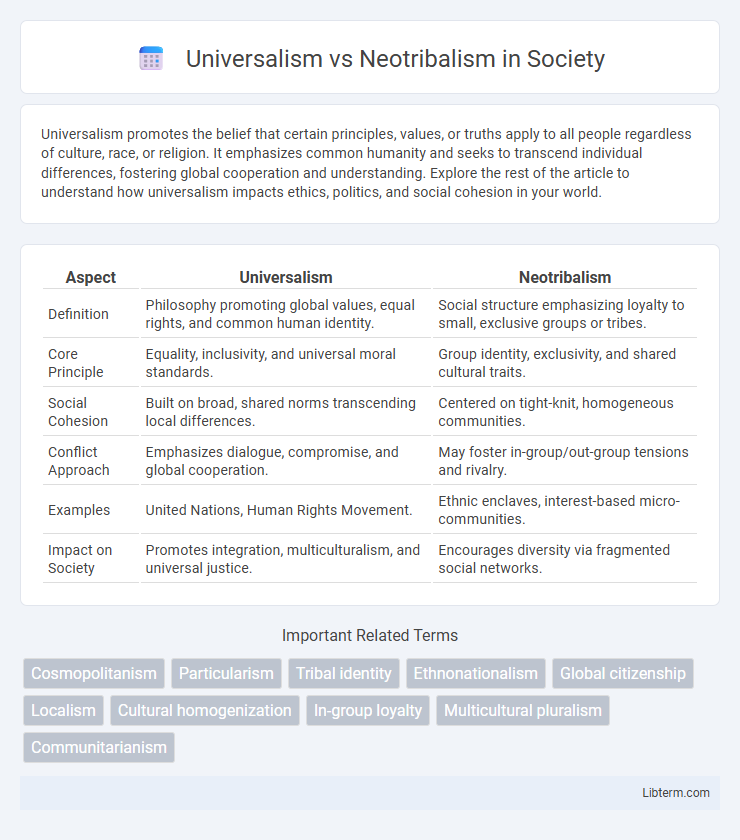Universalism promotes the belief that certain principles, values, or truths apply to all people regardless of culture, race, or religion. It emphasizes common humanity and seeks to transcend individual differences, fostering global cooperation and understanding. Explore the rest of the article to understand how universalism impacts ethics, politics, and social cohesion in your world.
Table of Comparison
| Aspect | Universalism | Neotribalism |
|---|---|---|
| Definition | Philosophy promoting global values, equal rights, and common human identity. | Social structure emphasizing loyalty to small, exclusive groups or tribes. |
| Core Principle | Equality, inclusivity, and universal moral standards. | Group identity, exclusivity, and shared cultural traits. |
| Social Cohesion | Built on broad, shared norms transcending local differences. | Centered on tight-knit, homogeneous communities. |
| Conflict Approach | Emphasizes dialogue, compromise, and global cooperation. | May foster in-group/out-group tensions and rivalry. |
| Examples | United Nations, Human Rights Movement. | Ethnic enclaves, interest-based micro-communities. |
| Impact on Society | Promotes integration, multiculturalism, and universal justice. | Encourages diversity via fragmented social networks. |
Understanding Universalism: Core Principles
Universalism emphasizes the application of universal moral principles and human rights across all cultures, advocating for equal consideration and respect regardless of individual or group differences. It asserts that certain ethical standards, such as justice and equality, are universally valid, transcending local customs or traditions. This core philosophy underpins international laws and global human rights frameworks designed to protect individuals universally.
Defining Neotribalism: Origins and Key Concepts
Neotribalism refers to a social theory that emphasizes the resurgence of tribal-like group identities in modern societies, originating from Michel Maffesoli's analysis of postmodern social structures. It argues that despite globalizing forces, individuals increasingly seek belonging through smaller, fluid, and emotionally connected communities, contrasting with the universalist ideal of inclusive, rational, and institutionalized group membership. Key concepts include the importance of affective bonds, collective identity, and the rejection of impersonal, bureaucratic systems prevalent in universalist frameworks.
Historical Context: Universalism and Neotribalism in Society
Universalism emerged during the Enlightenment, promoting universal rights, laws, and ethical principles to foster social cohesion across diverse populations. Neotribalism gained prominence in postmodern society, emphasizing the resurgence of smaller, identity-based groups that challenge the homogenizing effects of globalization and universalist ideologies. Historical shifts in societal organization reflect tensions between the global integration of Universalism and localized, fragmented identities championed by Neotribalism.
Globalization and the Return of Neotribalism
Globalization accelerates cultural exchange but also sparks a resurgence of neotribalism as individuals seek identity and belonging in smaller, more cohesive groups. Universalism promotes shared global values and norms, yet neotribalism emphasizes distinct local identities resisting homogenization. The tension between these forces shapes modern social dynamics, revealing how global connectivity coexists with a revival of tribal affiliations.
Universalism vs Neotribalism: Philosophical Differences
Universalism emphasizes the application of universal principles and values that transcend cultural and social boundaries, advocating for common ethical standards and human rights. Neotribalism, in contrast, prioritizes the revival of tribal identities and localized social networks, emphasizing group loyalty, customs, and traditions unique to specific communities. Philosophically, Universalism promotes inclusivity and global interconnectedness, whereas Neotribalism centers on particularism and the preservation of distinct cultural identities.
Social Cohesion: Inclusion or Fragmentation?
Universalism promotes social cohesion through inclusive policies and shared values that transcend individual identities, fostering a collective sense of belonging. Neotribalism, by contrast, often leads to social fragmentation as group loyalty intensifies, emphasizing distinct cultural or ideological boundaries. This divergence impacts societal stability, with universalism encouraging integration while neotribalism fuels divisions and identity-based conflicts.
Identity Politics: Navigating Group and Universal Belonging
Universalism promotes a collective identity based on shared human rights and values that transcend individual group distinctions, fostering inclusivity and global belonging. Neotribalism emphasizes the significance of smaller, distinct social groups defined by ethnicity, culture, or ideology, advocating for identity politics that prioritize particular group interests and unique experiences. Balancing universal principles with the recognition of diverse identities presents a complex challenge in achieving social cohesion and equitable representation.
Universal Rights in a Neotribal World
Universal rights, rooted in the principle of inherent human dignity, face challenges in a neotribal world where identity and loyalty prioritize tribal affiliations over global citizenship. Neotribalism fosters decentralized, culturally distinct groups that often interpret human rights through localized customs, potentially undermining universalist frameworks established by international law. Balancing universal rights with neotribal identities requires adaptive legal systems and cross-cultural dialogue to ensure basic freedoms remain protected amid diverse social realities.
Challenges and Criticisms of Both Perspectives
Universalism faces challenges in addressing cultural diversity and often risks imposing a one-size-fits-all approach that overlooks local identities and traditions. Neotribalism is criticized for potentially fostering exclusivity and fragmenting social cohesion by emphasizing small group loyalties over broader societal bonds. Both perspectives struggle to balance individual rights with collective identities in increasingly globalized and pluralistic societies.
Toward a Balanced Future: Bridging Universalism and Neotribalism
Universalism emphasizes global principles and shared human values, while neotribalism centers on localized identities and social cohesion within smaller groups. Bridging these approaches requires integrating universal human rights frameworks with respect for cultural diversity and communal bonds to foster inclusive societies. Developing policies that honor both collective affiliations and overarching ethical standards can promote harmony and resilience in a rapidly globalizing world.
Universalism Infographic

 libterm.com
libterm.com